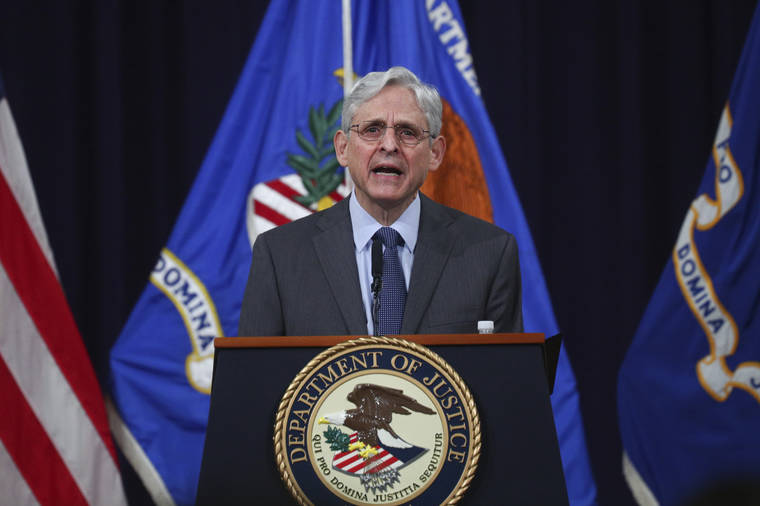WASHINGTON — The Justice Department will scrutinize a wave of new laws in Republican-controlled states that tighten voting rules, Attorney General Merrick Garland said Friday, vowing to take action on any violations of federal law.
He announced plans to double staffing within the department’s civil rights division and said the department would send guidance to states about election-related activity, including mail voting and post-election audits. He also pledged to investigate and prosecute those who would threaten election workers, noting a rise in such cases.
“There are many things open to debate in America, but the right of all eligible citizens to vote is not one of them,” Garland said in his first direct response to the restrictive voting laws being passed in more than a dozen states where Republicans control the legislature and governor’s office.
Speaking to staff of the agency’s civil rights division, he said the resources of the Justice Department must be rededicated to “meet the challenge of the current moment.”
His message was clear: The department doesn’t plan to stay on the sidelines of the voting battles that have erupted in statehouses across the country. Along with reviewing new state laws, Garland said the department also will examine existing ones for their potential to discriminate against minority voters.
He also reiterated the administration’s support for two proposals pushed by congressional Democrats that would create minimum federal standards for voting and would restore the ability of his agency to review changes to state election laws in places with a history of racial discrimination. A 2013 U.S. Supreme Court decision effectively set aside this “preclearance” requirement, and Democrats say it has resulted in a proliferation of restrictive voting laws in recent years.
Garland said false claims of voter fraud were being used to justify the new voting restrictions despite law enforcement and intelligence agencies having refuted those claims. He expressed concern that disinformation surrounding the 2020 election was fueling “abnormal post-election audit methodologies” to conduct partisan ballot reviews, like the one underway in Arizona.
Seven months after the election, former President Donald Trump continues to falsely insist that he won and demand that states investigate his unsubstantiated claims of voter fraud. Those claims have been resoundingly rejected by state officials who certified the results, judges who dismissed multiple lawsuits filed by Trump and his allies, and a coalition of federal and state officials who called the 2020 election the “most secure” in U.S. history.
Trump’s own attorney general said at the time there was no evidence of widespread fraud that would change the outcome.
But Republican state lawmakers in Arizona, Florida, Georgia, Iowa, Texas and elsewhere seized on Trump’s claims, pointing to concerns among his supporters as justification for a wave of new bills tightening voting rules. As of mid-May, 22 restrictive laws had passed in at least 14 states, according to the Brennan Center for Justice, which researches voting and supports expanded access.
Republicans in Texas are expected to call for a special session to push through an election overhaul that was derailed by Democrats on the last day of the regular session.
Republicans who support the new laws said action was needed to safeguard voting and restore public confidence in elections.
“Americans have been clear: they support laws making it easy to vote and hard to cheat in states across the country,” said Jessica Anderson, executive director of Heritage Action, which has been working to advance the legislative proposals. “Despite the false narrative coming out of the White House and now the Department of Justice, Americans support secure, fair elections, even if the Left does not.”
Voting right groups already have filed several lawsuits challenging the laws.
Garland’s comments come as the Justice Department is shifting its priorities to focus more on civil rights issues and ensuring equal protection under the law after a tumultuous four years in the Trump administration.
Along with tightening voting rules, Republicans also have pushed measures to expand the role of poll watchers, following complaints that their monitors did not have adequate access during the 2020 election. In Florida, a new law allows each candidate to have one watcher present during canvassing board meetings, which caused concerns about overcrowding and slowing ballot tabulation.
In a bill that eventually failed but is expected to be revived during a special legislative session, Texas Republicans pushed broad new criminal penalties for election workers who impede poll watchers.
Trump’s claims also have led Republican state senators in Arizona to use their subpoena power and launch a partisan review of the 2.1 million ballots cast in Maricopa County. The audit will not change the outcome of the election, which was certified by the state’s Republican governor after multiple reviews, a standard procedure following every election. But Trump has called for more reviews in other states he lost, including Georgia and Pennsylvania.
The Justice Department has sent a letter expressing concern about the Arizona review, and Garland vowed that his department would ensure any post-election review abides by federal law to “protect election records and avoid the intimidation of voters.”
Election experts have pointed to major flaws in the process unfolding in Arizona and said the Republican effort could further erode confidence in the democratic process.
———
Cassidy reported from Atlanta.


